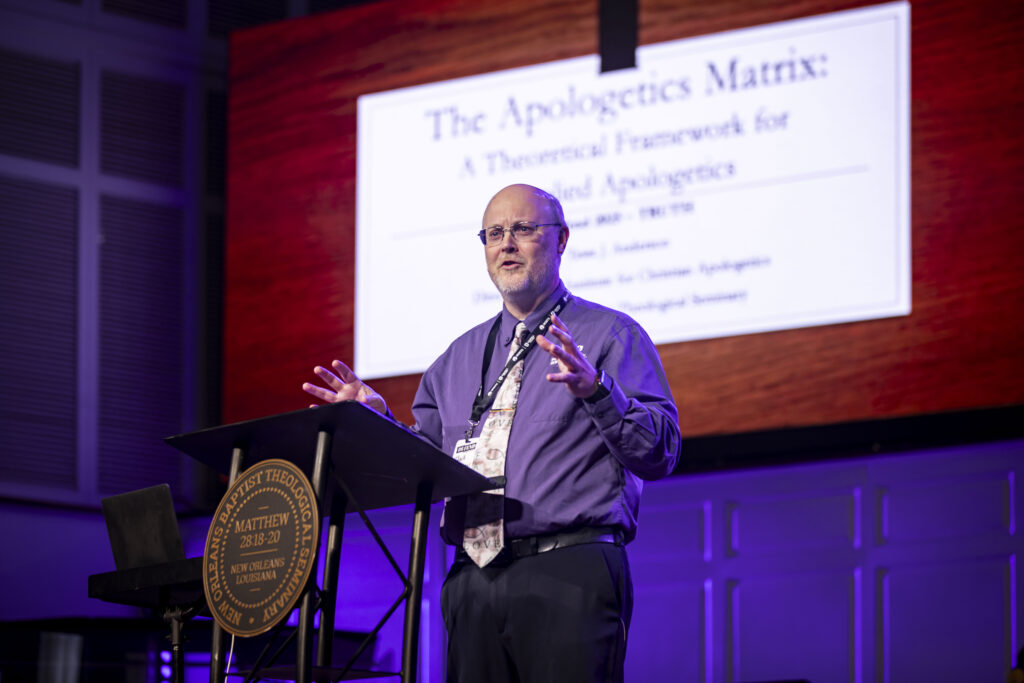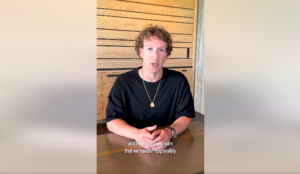
NOBTS Defend apologetics conference draws nearly 400 attendees in 16th year
By Timothy Cockes
NEW ORLEANS (BP) – The 16th annual Defend apologetics conference at New Orleans Baptist Theological Seminary drew nearly 400 attendees from more than 100 churches and 21 states Jan. 6-10.

Conference guests heard lectures from a variety of plenary and breakout speakers about various apologetics topics including transgenderism, sexuality, doubt and suffering, the deity of Christ, science and Christian faith, atheism, beauty, the purpose of apologetics and much more.
Tawa Anderson, NOBTS associate professor of philosophy and apologetics and first-time director of Defend, opened the conference with a plenary message about the importance of Christian apologetics for all believers, drawing from the well-known passage of 1 Peter 3:13-17, from which the conference gets its name.
“If you’ve been to Defend before, you’ve seen this verse,” Anderson said to the audience Monday night, Jan. 6. “As you’re at Defend this week, you’re going to see this verse multiple times.
“This passage is a well-known passage where we see what we call the ‘apologetic mandate.’ God is commanding all Christians to be ready to answer questions that people have concerning our faith. It’s not the apologetic suggestion, where God gives us the option, if we are so inclined or feel we have the right abilities, to try to answer people’s questions.
“It’s an apologetic mandate, commanding believers everywhere to always be prepared to give an answer to everyone who asks you to give the reason for the hope that you have. All believers are commanded to participate in apologetics.”

Anderson, who also serves as the director of the seminary’s Institute for Christian Apologetics and the Greer-Heard chair of faith and culture, said not only does the Bible command believers to engage in apologetics, but Scripture also provides examples of apologetics in practice.
“Scripture presents us with examples of apologetics and the commandment to engage in apologetics. God commands it, the Bible demonstrates it and we ought to be doing it,” Anderson said.
Anderson then presented his “apologetics matrix” approach that examines how apologetics can be used to strengthen the faith of believers and pique the interest of skeptical non-believers.
Other plenary speakers at the weeklong conference included Mike Blackaby, pastor and church planter; Mary Jo Sharp, author and apologist; Mike Strauss, professor of physics at the University of Oklahoma; James Walker, president of the Watchman Fellowship; Melissa Cain Travis, science and religion scholar; Rob Bowman, apologist and scholar, and many more.
Breakout topics included:
- Christianity and Science
- Ethics and Moral Apologetics
- Suffering and Doubt
- The Problem of Evil
- Cults and Other Religions
- Philosophical Apologetics
- Cultural Apologetics
- Biblical Apologetics
To learn more about upcoming NOBTS conferences and events, click here.
Samford receives $5M grant to invigorate rural small-town churches
By Samford University Staff
BIRMINGHAM, Ala. (BP) – Samford University has received a grant of $5 million—the largest single grant in the university’s 183-year history—from Lilly Endowment Inc. through its Ministry in Rural Areas and Small Towns Initiative. The grant will support the work of Samford’s Center for Congregational Resources, which provides services to help congregations become thriving ministries. The aim of Lilly Endowment’s initiative is to provide resources to help churches in rural areas and small towns enhance the vitality of their ministries and strengthen the leadership of the pastors and lay leaders who guide them.
Samford University’s Center for Congregational Resources intends to develop the Equipping the Called Leadership Program to help Christian churches cultivate the spiritual formation of congregants and function as anchor institutions that strengthen their local communities. Content for this program will be developed in partnership with Samford scholars who have expertise in theological education, practice of ministry, physical and mental health education, business administration and community development.
“This impactful gift from Lilly Endowment, implemented through the work of the Center for Congregational Resources and Samford faculty, provides resources to help rural and small-town churches and ministries thrive,” said Dave Cimbora, Samford’s provost and vice president for academic affairs. “By partnering in the training of ordained and lay leadership, we foresee this new program invigorating churches to deepen collaborations across their communities.”
Samford University is one of 20 organizations from across the United States receiving grants through the initiative, including colleges and universities, denominational agencies, church networks, and parachurch organizations, among others.
“Our hope is that these grants will provide much needed resources and support to rural and small-town churches to help them address their challenges and enhance and extend the many ways that they serve their communities,” said Christopher L. Coble, Lilly Endowment’s vice president for religion.
Lilly Endowment Inc. is an Indianapolis-based private philanthropic foundation created in 1937 by J.K. Lilly, Sr. and his sons Eli and J.K. Jr. through gifts of stock in their pharmaceutical business, Eli Lilly and Company. Although the gifts of stock remain a financial bedrock of the Endowment, it is a separate entity from the company, with a distinct governing board, staff and location. In keeping with the founders’ wishes, the Endowment supports the causes of community development, education and religion and maintains a special commitment to its founders’ hometown, Indianapolis, and home state, Indiana.
A primary aim of its grantmaking in religion is to deepen the religious lives of Christians, principally by supporting efforts that enhance congregational vitality and strengthen the leadership of Christian communities. The Endowment values the broad diversity of Christian traditions and endeavors to support them in a wide variety of contexts. The Endowment also seeks to foster public understanding about religion by encouraging fair, accurate and balanced portrayals of the positive and negative effects of religion on the world and lifting up the contributions that people of all faiths make to our greater civic well-being.


















